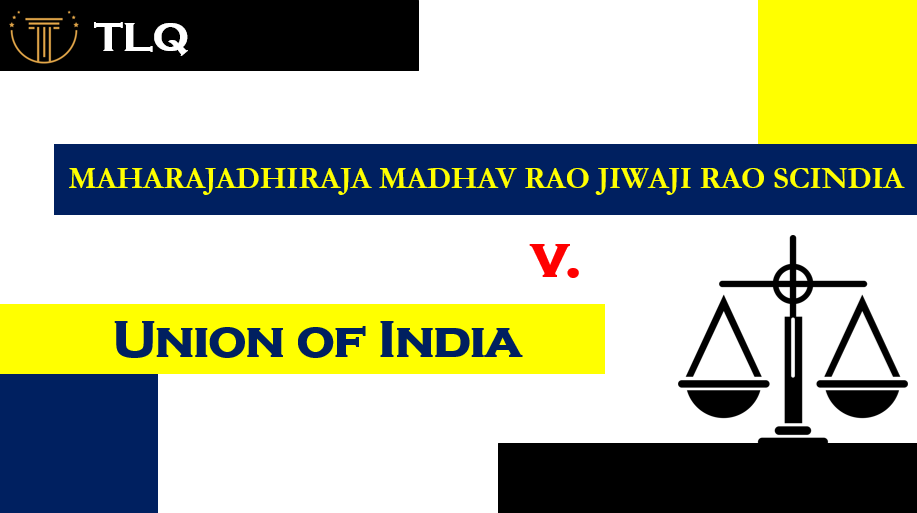Published On: 11th November, 2023
Authored By: Kriti Sharma
Ibrahim Ahmad Batti v. State of Gujarat
AIR 1982 SC 1500
FACTS
The petitioner or the detenu Ibrahim Ahmad Batti who was detained on the order issued under section 3 (1) of the COFEPOSA on 19th April 1982 was directed to be released forthwith by the Advisory Board i.e. 1st July, because the detaining authority failed to supply the translations in Urdu of the ground, and documents relied upon which was a clear violation of the constitutional mandate of Art. 22 (5). Even after the said direction, he continued to be in judicial custody for the pending charges under the Arms Act and the Foreigners Act. Despite any chances of him absconding, the detaining authority issued the impugned order of detention against the petitioner under s. 3 (1) of the COFEPOSA the same day and served it on him on 2nd July 1982.
The basic grounds of detention along with the copies of statements and documents relied upon were served in English, Urdu, and regional language upon the petitioner on 7th July 1982 while the rest, but not the entire, of the bulk were supplied to the petitioner on 15th July 1982. The petitioner challenged the impugned detention order by filing a writ petition under Art. 32 of the Constitution on the ground that it was a breach of the constitutional safeguards contained in Art. 22 (5) read with section 3 (3) of the COFEPOSA which requires the communication of all grounds plus all the relevant documents, statements, etc relied upon within 5 days and only in exceptional circumstances within 15 days so that the detenu can exercise his right of making a representation against his detention.
In this case, the detaining authority took 13 days to provide the same in the detenu’s mother tongue seeking the existence of exceptional circumstances that required several Urdu translators were not available due to Ramzan season and that not all the material relied upon was served to him and the explanation given by the authority within the first 5 days was close to their reliance on the fact that the grounds and the material served was in English and the regional languages which was understandable to the detenu.
ISSUES
- Whether such delay was a reasonable justification for the existence of any exceptional circumstances, as required by Section 3 (3) of the COFEPOSA, otherwise rendering the detention illegal?
- Whether the detaining authority while supplying the Urdu translations beyond the normal period of 5 days, as a matter of duty cast by necessary implication, should have indicated the detenu the delay was being caused due to exceptional circumstances?
- Whether non-supply of Urdu translations of these documents be said to have caused any prejudice to the petitioner in the matter of making a representation against his detention?
RATIONALE
Issue 1:
The Hon’ble courts explain that a person preventively detained does not have many methods of safeguards available at its disposal as compared to any other person charged with the commission of any offence and thus, whatever little constitutional and legislative safeguards are available they assume utmost importance and must be strictly adhered to and one such safeguard necessary presence of exceptional circumstances for a delay beyond 5 days in serving the ground and material documents in the script or language that detenu understands. The court thinks that firstly there was no urgency to issue the impugned order of detention on the same day as the detenu was already in judicial custody and secondly, the unreasonable explanation of insufficient resources due to particular community festivals is hard to digest since with all its power and resources the State Government could have easily managed to find requisite number of qualified persons to do the task in given 5 days. Thus, it is opined that exceptional circumstances did not exist and a constitutional and legislative breach has been made rendering the detention illegal.
Issue 2:
As per COFEPOSA, the detenu has a right to make a representation to an authority that is superior to the detaining authority or the Advisory Board which can be made only on the merits of the grounds of detention to have his detention revoked or quashed. Thus, a delay in the supply of grounds beyond normal 5 days without the presence of any exceptional circumstance would be fatal to the continued detention of the detenu. This will give a chance to the detenu to satisfy either the superior authority or the Advisory Board that unjustified delay has occurred in the supply of requisite material to him since no exceptional circumstances existed or those put forward were unreal or invalid. But Detenu will be in no such position if the alleged exceptional circumstances are not communicated to him. Thus in the opinion of the court, the duty on the detaining authority to inform the detenu about the existence of exceptional circumstances arises by necessary implication and flow from the right which is conferred upon the detenu to make representation against his detention. As in the given case had the detenu been informed of these exceptional circumstances within the given time frame of 5 days, he could have presented his case about this before the superior authority or the Advisory Board itself. Therefore, the petitioner’s continuing detention is invalidated by the impugned failure in this case, which also represents a breach of the safeguard included in Art. 22(5) read with s. 3(3) of the COFEPOSA.
Issue 3:
The court is hardly satisfied with the explanation of the respondent that the petitioner understands the English language and has the ability to converse in Hindi and Gujarati and condones the non-supply of Urdu translations. According to the Hon’ble court, this does not justify the denial of Urdu translations of the documents and statements which are material in the opinion of the court since they played a huge role in arriving at its subjective satisfaction of the detaining authority. Also since Urdu seems to be the mother tongue of the detenu non-supply of Urdu translations of these documents has clearly prejudiced the petitioner in the exercise of his right to make an effective representation against his detention and hence the safeguard contained in Art. 22(5) is violated.
HELD
The Hon’ble court held that the continued detention of the petitioner would be illegal and accordingly the same was quashed and direction was given for him to be released forthwith as the unnecessary delay in serving the translations hampered his right to representation at the earliest thereby causing a violation of Art. 22 (5) read with section 3 (3) of the COFEPOSA.


